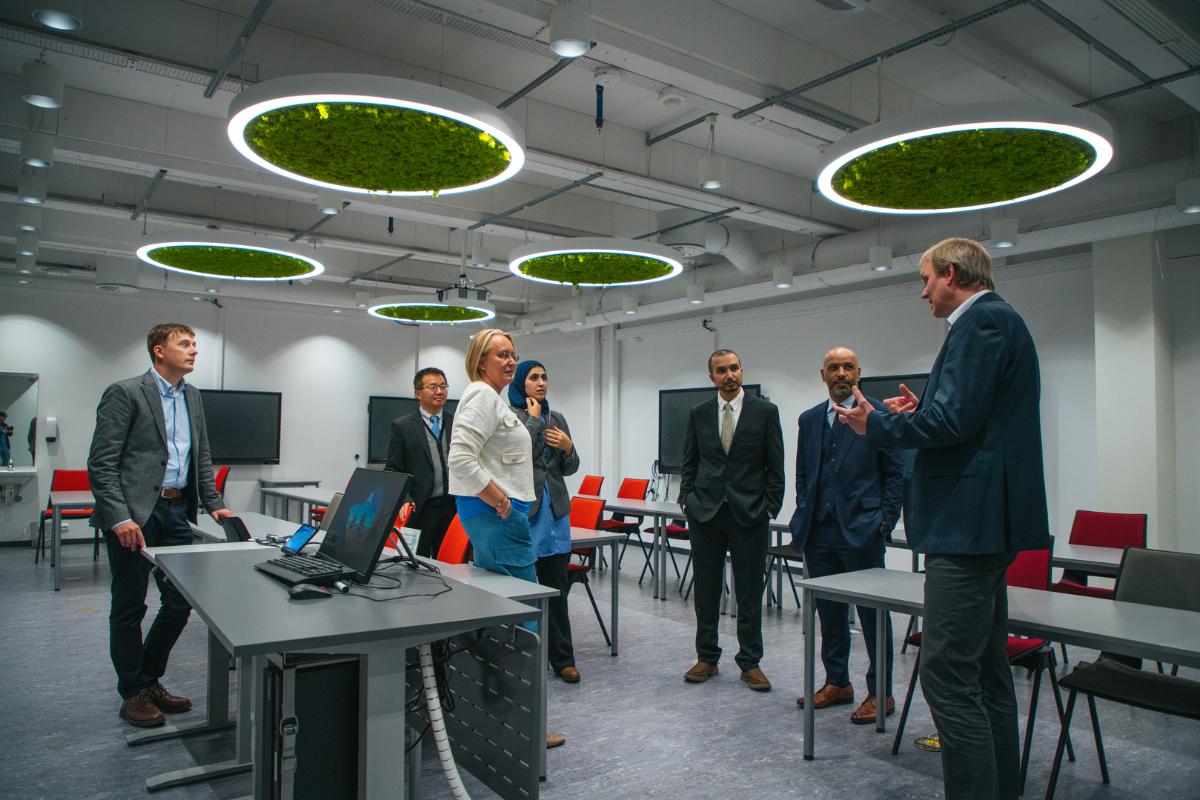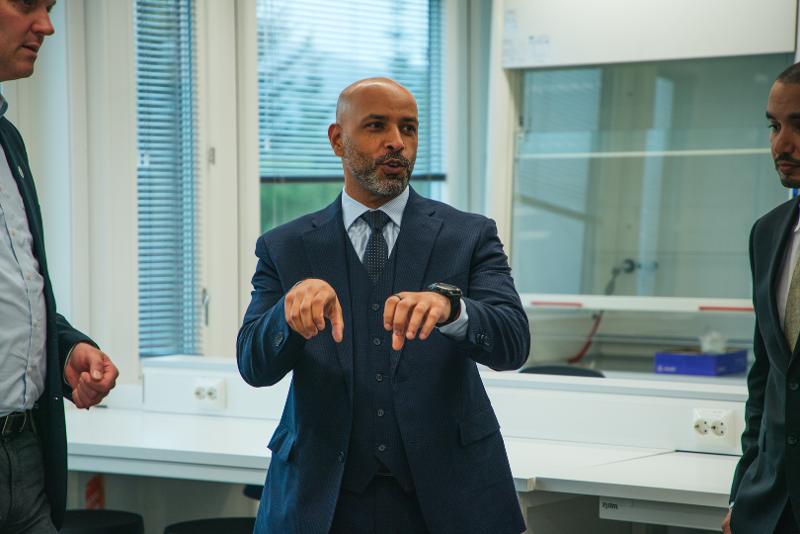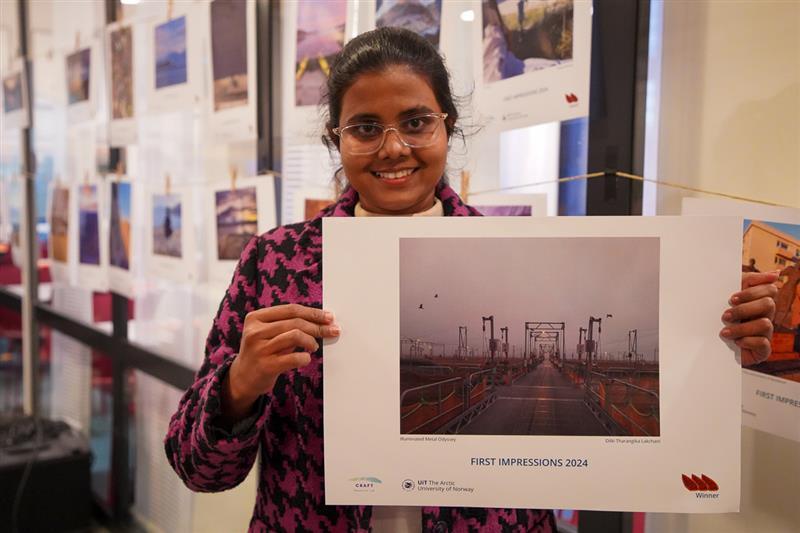Aim for research collaboration on circular economy
What similarities does Norway have with the Gulf state, United Arab Emirates? According to the president of Khalifa University, we face the same challenges in creating a more diverse and sustainable economy.

From August 26 to 27, UiT received its first formal visit from a delegation from Khalifa University (KU), in Abu Dhabi, United Arab Emirates. This followed a visit in April by a representative from the country's Ministry of Foreign Affairs who was briefed on UiT's climate and environmental research.
KU has around 5000 students from 50 countries and was founded in 2017. Both research and educational programs at KU specialize in the strategic, scientific, and industrial challenges faced by the knowledge economy in the Gulf state.
During the visit, lectures and presentations were held that focused on the environmental and technological changes the world is facing. The delegation was then given insight into UiT's Arctic Ocean 2050 program, research on glaciers and sea level rise, marine ecology, meteorology and climate in polar regions, space debris, and artificial intelligence.
The delegation also received a tour of the IC3 Center for Ice, Cryosphere, Carbon and Climate and the Institute of Geosciences.
Innovation and entrepreneurship are priorities at Khalifa University, and in this area, we can gather ideas and inspiration.
Collaboration on sustainable solutions
The President of Khalifa University, Dr. Ebrahim Al Hajri, believes there are several similarities between the United Arab Emirates and Norway. He points out that both countries are in the process of further developing their economies away from dependence on oil and gas. Al Hajri adds that Khalifa University emphasizes research on how transitioning to a knowledge-based economy can contribute to a more diverse economy, where more resources are utilized.

"We convert this research into commercial opportunities that will ensure the growth of the circular economy in our country. An area where we can collaborate with UiT is research in the energy sector, and how we can make this sector sustainable for future generations and ensure that we do not negatively impact the environment. We also see many opportunities for collaboration on AI technology and research in both the Arctic and Antarctica, on how global warming affects our lives and the environments at both poles," says Al Hajri.
From fossil to renewable
Facts about Khalifa University
- Facts about Khalifa University
- Has campuses in Abu Dhabi, United Arab Emirates
- Founded in 2017
- Has around 5000 students
- Specializes in strategic, scientific, and industrial challenges related to the development of the knowledge economy
Prorector for Research and Development at UiT, Jan-Gunnar Winther, says that UiT has had meetings with the KU delegation about possible research collaboration on green societal transformation. Among other things, the transition from fossil to renewable energy sources was an important topic. Khalifa University has a leading role in this area of research, especially regarding production of hydrogen from renewable energy.
"Innovation and entrepreneurship are priorities at Khalifa University, and in this area, we can gather ideas and inspiration. The meeting has clarified that we have several fields of expertise with complementary competencies that offer opportunities for future R&D collaboration," states Jan-Gunnar Winther.
From 2018 until 2023 UiT researchers have co-published 102 articles with colleagues from the United Arab Emirates, of which 48 of the articles have co-authors from Khalifa University.
Al-Hajri looks forward to a good dialogue and collaboration with UiT in several areas in the coming years. For him, an important step is that students and scientific staff from KU will participate in the One Ocean expedition with the sailing ship Statsraad Lemkuhl from 2025 to 2026.
This is a circumnavigation where students from several countries can learn more about sustainability and future environmental challenges. UiT is responsible for the polar part of the training program, which will be conducted in the fall of 2025, during a voyage through the Northwest Passage in Canada.
-
Fiskeri- og havbruksvitenskap - bachelor
Varighet: 3 År -
Fiskeri- og havbruksvitenskap - master
Varighet: 2 År -
Akvamedisin - master
Varighet: 5 År -
Peace and Conflict Transformation - master
Varighet: 2 År -
Computer Science - master
Varighet: 2 År -
Geosciences - master
Varighet: 2 År -
Biologi - bachelor
Varighet: 3 År -
Nordisk - årsstudium
Varighet: 1 År -
Historie - årsstudium
Varighet: 1 År -
Engelsk - årsstudium
Varighet: 1 År -
Arkeologi - bachelor
Varighet: 3 År -
Informatikk, datamaskinsystemer - bachelor
Varighet: 3 År -
Informatikk, sivilingeniør - master
Varighet: 5 År -
Allmenn litteraturvitenskap - årsstudium
Varighet: 1 År -
Geovitenskap- bachelor
Varighet: 3 År -
Farmasi - master
Varighet: 2 År -
Romfysikk, sivilingeniør - master
Varighet: 5 År -
Klima og miljøovervåkning, sivilingeniør - master
Varighet: 5 År -
Bærekraftig teknologi, ingeniør - bachelor
Varighet: 3 År -
Filosofi - bachelor
Varighet: 3 År -
Filosofi - master
Varighet: 2 År -
Anvendt fysikk og matematikk, sivilingeniør - master
Varighet: 5 År -
Arctic Nature Guide - one year programme
Varighet: 1 År -
Arktisk friluftsliv og naturguiding - bachelor
Varighet: 3 År -
Arktisk friluftsliv - årsstudium
Varighet: 1 År -
Grunnskolelærerutdanning for 1.-7. trinn - master
Varighet: 5 År -
Governance and Entrepreneurship in Northern and Indigenous Areas - master
Varighet: 4 År -
Internasjonal beredskap - bachelor (samlingsbasert)
Varighet: 3 År -
Landskapsarkitektur - master
Varighet: 5 År -
Grunnskolelærerutdanning for 5.-10. trinn - master
Varighet: 5 År -
Ph.d.-program i naturvitenskap
Varighet: 3 År -
Environmental Law - master
Varighet: 2 År -
Ph.d.-program i humaniora og samfunnsvitenskap
Varighet: 3 År -
Nordic Urban Planning - master
Varighet: 2 År -
Samfunnsøkonomi med datavitenskap - master
Varighet: 2 År -
Luftfartsvitenskap - master
Varighet: 3 År -
PhD Programme in Science
Varighet: 3 År -
PhD programme in Nautical Operations
Varighet: 3 År -
Filosofi - årsstudium
Varighet: 1 År -
Lektor i språk og samfunnsfag trinn 8-13 - master
Varighet: 5 År -
Fysikk og matematikk - bachelor
Varighet: 3 År -
Havteknologi, ingeniør - bachelor (ordinær, y-vei)
Varighet: 3 År -
Landscape Architecture - master
Varighet: 2 År -
Contemporary Issues in Risk and Crisis Management - master
Varighet: 2 År -
Informatikk, datafag - bachelor
Varighet: 3 År -
Computer Science - master
Varighet: 2 År -
Fornybar energi, sivilingeniør - master
Varighet: 5 År -
Bærekraftig kjemi og innovasjon, sivilingeniør - master
Varighet: 5 År -
Mediefag - årsstudium
Varighet: 1 År -
Strategisk ledelse og økonomi - erfaringsbasert master
Varighet: 5 Semestre

